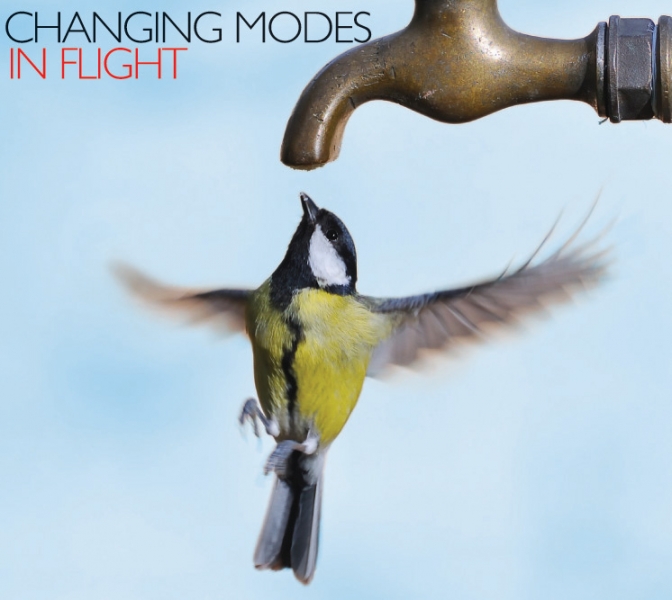
Changing Modes: In Flight (Plague of Twins)
There is an apocryphal story that Wendy Griffiths -- the primary singer/songwriter for Changing Modes -- initially "had no intention" of making her songs public. Five albums, two EPs, dozens of shows throughout the Northeast, and one M.E.A.N.Y. award (Musicians and Emerging Artists of New York) later, I can only say that I am happy she did not relegate her "bedroom tapes" to a shoebox in a closet.
Ms. Griffiths identifies her influences (at least on this album) well, particularly PJ Harvey and Blondie. However, the music on In Flight is quite a bit more "progressive" than that: there are whiffs of such prog-rock artists as Renaissance, The Decemberists, and even Frank Zappa here. Indeed, the most appropriate word I can find to describe Ms. Griffiths's music is: quirky. And I mean that as a very sincere compliment.
Ms. Griffiths uses lots of chromatics, tritones, deceptive cadences, and truly unexpected (even wild) chord progressions and melody lines, yet she has such amazing control over her music that this never comes across as random or inappropriate. Indeed, most of the songs have a "sense of the appropriate" (i.e., choice of instrumentation, arrangement, sound effects, etc. to create an overall atmosphere) that is fairly rare, particularly in current popular music.
One of the most remarkable aspects of Ms. Griffiths's compositions is that she has the rare ability to write satisfying (even jam-packed) songs in under three minutes: of sixteen songs, only four are longer than that, and none reach three-and-a-half minutes. In one case -- the hopelessly infectious "Ghost in the Backseat" -- she gives us a complete and satisfying song in under two minutes. Not since The Beatles have I heard that done with any degree of success.
Ms. Griffiths is not always consistent: though all of her compositions are good (and none are "plain vanilla"), and are certainly worthy of an ear (or two), not all rise to the same level. Still, the majority rise well above the norm of what passes for popular music these days, and Ms. Griffiths has set her own bar higher than most. I particularly like a number of songs that have a wonderful late '60s quality and feel to the music and lyrics, including "Particle Collider" (which has a complex rhythm and a Blondie-cum-Renaissance feel), "Life Drawing," and "Down to You." Also of note are "Reflection" (a sort of "slightly off" R&B), "Blue" (with a male vocal, weird (but excellent) piano, and that Decemberists feel), "Firewall" (a nice ballad with superb harmonies), "Thunderwing" (which goes from samba to circus and back), and the title track, which provides a truly wonderful coda to the album, including a nice use of synthesizer.
Yet if I had to pick the tracks that most represent Ms. Griffiths's approach on this album, it would be "Nature of the Beast" (with a chord progression and melody that are truly "out there"!), "Politics of Fear" (as quirky as it gets), and "Professional Girl" (a lovely song that moves from soft rock into a wonderful jazz feel).
Ms. Griffiths's voice is pleasant and expressive: less concerned with perfect tonality than with "getting her point across," which she does extremely well. She also has a deceptively subtle approach to vocal harmonies that is refreshing. Ms. Griffiths is also a very talented pianist: she obviously has a grasp on quite a few styles, and her choices are always interesting and often compelling. The band provides excellent, rock-solid back-up (particularly her guitarist), complementing the quirkiness of her writing style. And although her music is generally classified as "rock," I believe that, at least with this album, Ms. Griffiths straddles the line into progressive rock. And in my book, that cannot be a bad thing.
I very much look forward to hearing more Changing Modes in the future.
